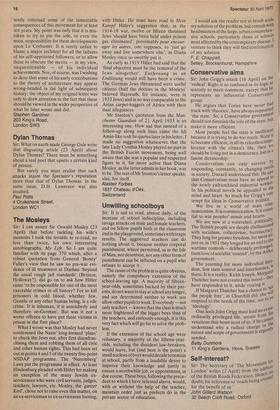The Mosleys
Sir: I can assure Sir Oswald Mosley (23 April) that before tackling his wife's memoirs I took the trouble to re-read, no less than twice, his own interesting autobiography, My Life. So I am quite familiar with its page 370 which, after a robust quotation from General `Boney' Fuller's view that he saw no pre-war evidence of ill treatment at Dachau 'beyond the usual rough jail standards' (Brixton, Holloway?), did go on to ask how Hitler came 'to be responsible for one of the most execrable crimes in all history? For to kill prisoners in cold blood, whether Jew, Gentile or any other human being, is a vile crime. It is inhuman, it is unsoldierly and therefore un-German'. But was it not a worse offence to have put these victims in prison in the first place?
What I wrote was that Mosley had never condemned the Nazis' long-formed 'plans' to chuck the Jews out, after first disenfranchising them and robbing them of all civic and other human rights. This had been set out in points 4 and 5 of the twenty five-point NSDAP programme. The 'Nuremberg' Laws put the programme in effect. At least Hindenburg pleaded with Hitler for making an exception of the many Jewish exservicemen who were civil servants, judges, teachers, lawyers, etc. Mosley, the 'ganzer Kerr, chose not to raise even this matter, on an ex-serviceman to ex-serviceman footing, with Hitler. He must have read in Mein Kampf Hitler's suggestion that, in the 1914-18 war, twelve or fifteen thousand Jews 'should have been held under poison gas, eliminated', presumably pour encourager les autres, one supposes, to 'just go away and live somewhere else', as Diana Mosley once so sweetly put it.
As early as 1919 Hitler had said that the 'final objective must be the removal of the Jews altogether'. Entfernung as an Endlosung would still have been a crime. The German Jews threatened were useful citizens (half the doctors in the Mosleys' beloved Bayreuth, for instance, were in 1933 Jews) and in no way comparable to the Asian carpet-baggers of Africa with their dual allegiances.
Mr Stanton's quotation from the Manchester Guardian of 21 April 1933 is an interesting one. How sad that instead of a follow-up along such lines came the Idi Amin-like tosh he quotes later in his letter. I made no suggestion whatsoever, that the late Lady Cynthia Mosley played no part in the British Fascist movement, being well aware that she was a popular and respected figure in it, far more active than Diana Mosley, as the latter admits in her book, was to be. The rest of Mr Stanton's letter speaks, alas, for itself.
Alastair Forbes 1837 Chateau d'Oex, Switzerland


































 Previous page
Previous page